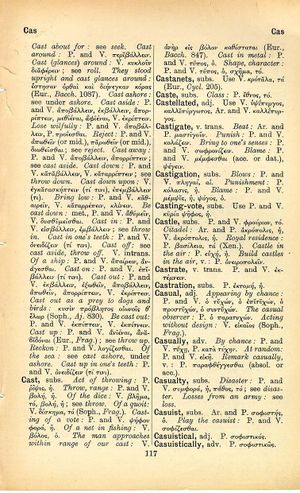castigate: Difference between revisions
From LSJ
κάλλιστον ἐφόδιον τῷ γήρᾳ ἡ παιδεία (Aristotle, quoted by Diogenes Laertius 5.21) → the finest provision for old age is education
(6_3) |
(D_2) |
||
| Line 12: | Line 12: | ||
{{Lewis | {{Lewis | ||
|lshtext=<b>castīgātē</b>: adv., v. [[castigo]]. | |lshtext=<b>castīgātē</b>: adv., v. [[castigo]]. | ||
}} | |||
{{Gaffiot | |||
|gf=<b>castīgātē</b> ([[castigatus]]),<br /><b>1</b> avec réserve, retenue : Sen. Rhet. Contr. 6, 8<br /><b>2</b> d’une manière [[concise]] : Macr. Scip. 1, 6 || -[[tius]] Amm. 22, 3, 12, avec [[plus]] de réserve. | |||
}} | }} | ||
Revision as of 06:39, 14 August 2017
English > Greek (Woodhouse)
v. trans.
Beat: Ar. and P. μαστιγοῦν.
Punish: P. and V. κολάζειν.
Bring to one's senses: P. and V. σωφρονίζειν.
Blame: P. and V. μέμφεσθαι (acc. or dat.), ψέγειν.
Latin > English (Lewis & Short)
castīgātē: adv., v. castigo.
Latin > French (Gaffiot 2016)
castīgātē (castigatus),
1 avec réserve, retenue : Sen. Rhet. Contr. 6, 8
2 d’une manière concise : Macr. Scip. 1, 6

